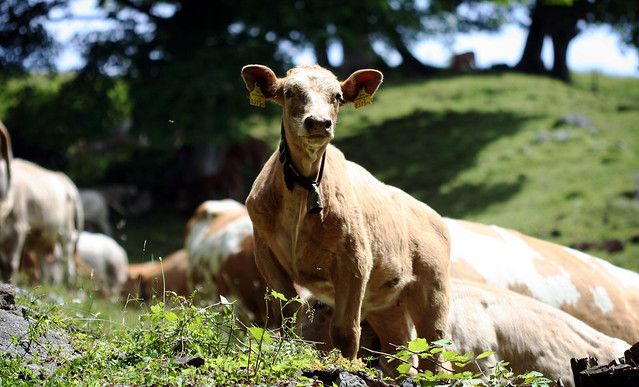This really is a time of change for the EU. As of next year, the EU Common Agricultural Policy (CAP) – a behemoth that costs Europeans 58 billion Euros per year and represents almost 40% of the EU’s budget – is due to be reformed. And on March 13th, the European Parliament is expected to vote on its position on those reforms. As such, all Europeans can ask their representatives to lobby for a more green, more just and more sustainable CAP. Why should you care?

Image by Mathias Erhard, via Flickr Creative Commons.
In the past, the CAP has been infamous for encouraging overproduction and the growth of ever larger agricultural enterprises, rather than supporting the small farmers it set out to protect from world market competition – over the last 10 years, employment in farming has dropped by 25%, costing 3.7 million jobs. In addition, this industrial approach to farming has had enormous consequences on the environment and biodiversity of European rural areas:
- In rural areas, the populations of about 80% of farmland birds, 33% of insects and 50% of plants have disappeared.
- 92% of rivers, lakes and aquifers in the EU have seen negative impacts due to agricultural activities, including pollution, over-abstraction and habitat change.
- In addition, the agrifood industry contributes to 29% of European greenhouse gas emissions.
- According to a 2011 Eurobarometer poll, 77% of Europeans demand stronger environmental conditions in the EU’s agricultural policy.
According to a large coalition of environmental groups, however, the European Parliament’s Committee on Agriculture and Rural Development (AGRI) proposed not an improvement, but a step backwards in terms of linking agricultural subsidies to environmental compliance for the 2014-2020 reform – thus creating a gap between the societal value of environmental services and how they are actually rewarded monetarily.
The CAP distributes 75% of its money as “direct payments” to farmers to subsidize their production – an average German farm for example receives 44% of its income from Brussels. These direct payments are linked to certain obligations in terms of production methods (the so-called cross-compliance), according to which farmers have to respect a set of rules linked to animal and plant health, food safety, and the environment. The European Commission’s suggestions for reform included the “greening” of these subsidies, obliging farmers to stick to more ambitious good farming practices. However, the AGRI committee’s suggestions for more “flexibility” would create exemptions from the greening obligations for a number of farms, and allow them to be replaced with weaker measures. In fact, raising the exemption threshold to 10 hectares would exempt 82% of European farms from having to adopt greening practices.
Furthermore, the AGRI committee’s report suggests double funding for environmental practices, and waters down or deletes half of the cross-compliance minimum requirements. It also doesn’t properly address the support of so-called “High Nature Value” and organic farming, and finally voted in favor of costly insurance schemes that would encourage farmers’ risk-taking.
Thus, the coalition – including, but not limited to the WWF, IFOAM, Bird Life International and the European Environmental Bureau, and consisting of 270 civil society organizations overall -, demands of Ministers of the European Parliament (MEPs) to do the following in the plenary vote on the Parliament’s official negotiating position:
- ENSURE all farmers undertake good farming practices (so-called ‘greening’), respecting the environment in return for CAP direct subsidies.
- REJECT illegal double payments, proposed by the AGRI Committee, which would pay farmers twice for carrying out the same activity.
- REINTRODUCE requirements for farmers to comply with EU laws on the environment, food safety, animal and public health when receiving EU subsidies.
- SUPPORT High Nature Value and organic farming systems by prioritising these sustainable farming systems, for example through specific thematic sub-programmes.
Do you support the same? If yes, make your voice heard! If you are a European citizen, you can send your MEP a message saying so. All you need is your zip code and it will automatically find the right person.
Make your voice heard and decide where your tax Euros go! Already 35,229 citizens have sent a message to their MEPs – will you be next?
Bonus: Here are a succinct overview of the issue. A fact sheet that explains the 13 reasons for a Green CAP and gives examples of both best practices and of misguided policies can be found here. Also, this is an excellent webpage full of resources regarding past and current CAP legislation and negotiations.
Reblogged this on thinkingcountry and commented:
Next Wednesday the European Parliament will be voting on its position on the Common Agricultural Policy (CAP) reforms. Janina’s article is really worth exploring.